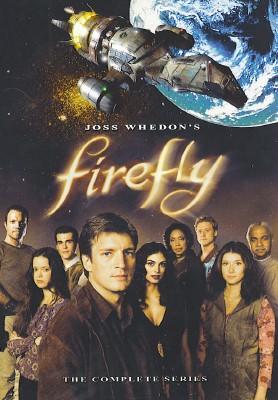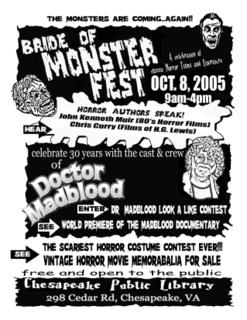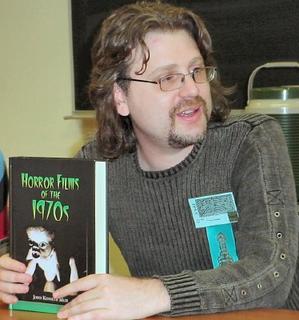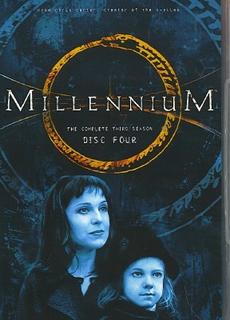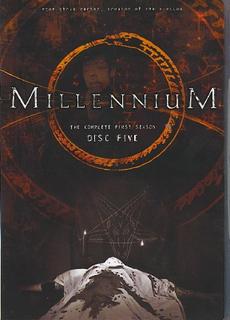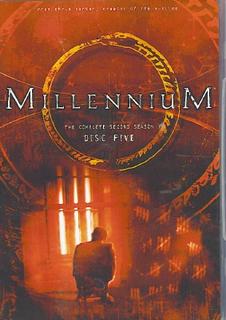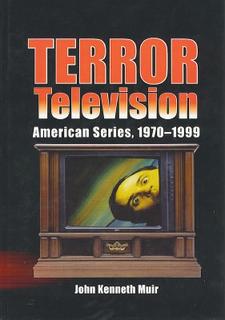Well, this isn't exactly the review I was expecting to write this morning. To get the surprise out of the way, the fact is, I rather liked and enjoyed ABC's new program, The Night Stalker, a re-make of the classic Kolchak: The Night Stalker from 1974.
I wasn't expecting to like it, for many reasons. For one thing, most of the advance buzz from fans was negative. Perhaps I should have expected that. It seems there's always rampant negativity on the 'Net these days, whenever a program debuts. If there had been an Internet fan community when Star Trek premiered in 1966, the show would have lasted six episodes, never prospered in reruns, and never gained the stature it enjoys today. Too many people would have bitched about it. ("Their uniforms had two braids on the wrist this week," one talkbacker would complain, "it had three braids last week..."). So really, I have to keep my awareness of fan bitching in check. I shouldn't let it preclude my enjoyment of a new series.
I wasn't expecting to like it, for many reasons. For one thing, most of the advance buzz from fans was negative. Perhaps I should have expected that. It seems there's always rampant negativity on the 'Net these days, whenever a program debuts. If there had been an Internet fan community when Star Trek premiered in 1966, the show would have lasted six episodes, never prospered in reruns, and never gained the stature it enjoys today. Too many people would have bitched about it. ("Their uniforms had two braids on the wrist this week," one talkbacker would complain, "it had three braids last week..."). So really, I have to keep my awareness of fan bitching in check. I shouldn't let it preclude my enjoyment of a new series.
The second reason I was concerned about The Night Stalker is one that reveals my age. Call it generational allegiance or nostalgia. I'm a huge fan of the original show starring Darren McGavin. It's high on the list of my top 50 genre shows, and, well, I wasn't sure what tampering with an acknowledged classic would accomplish. I mean, can't you leave it alone?
Third, I wasn't too keen on the idea of Stuart Townsend inheriting the role of Carl Kolchak. I have nothing against Townsend personally or professionally. He's a fine actor, and I'm sure a decent human being. But, Carl shouldn't be played by a traditional, good-looking leading man. He needs the edge that only a character actor (like James Wood, or Tony Shaloub) could give him. Darren McGavin was never better than as Kolchak. It was a career-defining role for the actor, and so it's rather hard to see anybody else in the part.
So for those three reasons, I was certain I was going to despise The Night Stalker, airing on Thursdays at 9:00 on ABC. But lo and behold, I liked the pilot.
It's true, this remake has a totally different vibe. I desperately miss the seedy, cramped offices of the INS, where Carl used to work...which looked like they hadn't been cleaned in...forever. I missed Kolchak's rumpled suit and his ratty, crappy demeanor. I missed the character's crusading-for-the-truth obsession, and his non-existent personal life (his work was his life). I missed his rat-a-tat banter with Vincenzo, and his combative, argumentative and probing attitude with elected officials at news conferences.
All those elements are gone with the wind, it's true.
And yet...the new show has something. Some quality. Maybe it's because Frank Spotnitz, late of The X-Files is at the helm, but I honestly felt this pilot was scary. Big time scary. The opening scene - an attack on a pregnant woman in her kitchen - was a humdinger, and more terrifying than anything I've seen on Supernatural in three weeks. Since this show is called The Night Stalker, I was happy to see that many scenes actually occurred at night (like the original series). That's another problem with Supernatural. Much of the horror there occurs in broad daylight (I'm thinking both of "Wendigo" and "Dead in the Water" here), and well, that's really hard to make work. The chill of the night air is palpable in this Kolchak remake, and it set me on edge.
Secondly, I thought the show did strive to create a unique aura that would separate it from the supernatural pack (meaning The X-Files, Supernatural, Poltergeist: The Legacy, Forever Knight, Millennium and so on...). With all the lovely nighttime shots of the city lights, gleaming silver skyscrapers, isolated cars speeding on asphalt highways, and quick cuts to lonely, strange perspectives (a rattling wind chime, a gently swaying swing on a playground), I indeed felt the vibe of an isolating, dehumanizing metropolis; a place where there may be plenty of people around, but they don't connect; don't help one another. It's a frightening phantasm of modern urban America, a place where people see, but don't help. Where people close their eyes and choose not to believe something that is unbelievable. Is this a different view of life than the original Kolchak: The Night Stalker, which was born in post-Watergate America, when Woodward and Bernstein were national heroes? Definitely, but in a sense, it's a vision that upholds the idea of the little guy vs. City Hall that was so appealing in the original incarnation. In the 1974 progenitor, Kolchak was a nobody, just a fly in the ointment, but here, it's even worse. This Kolchak is actively despised and persecuted by the establishment. Interesting.
I also very much liked Kolchak's voiceover narration. This is an ideal notion for a series about an investigative reporter, a writer. We should hear his words, understand how he puts things together, and why he does so. It gives us an "in" to his mind. The original series utilized the conceit of the tape recorder with Kolchak taping his notes, then hammering the contents out on his typewriter. Even The X-Files, in its earliest days, featured Scully and Mulder writing case reports, and reading from their findings in thoughtful voiceover. It's a technique that can be quite powerful, and I liked how it was used here, with specific words highlighted on the screen. Very artful. Very experimental. Very different.
The climax of The Night Stalker's pilot was edited with such dazzling ferocity that it was actually difficult to make out what happened to whom, and how. But you know something? I'm okay with that. I'll take ultra-fast glimpses of a monster rather than a full-on CGI shot any day of the week. I also appreciated that the story resolved literally nothing. We spent an hour hunting something (a coyote? a hellhound?) and at the end of that time still really knew not much about it. That's very different and bold for TV; it's called ambiguity. Everything wasn't resolved neatly and cleanly (again, I think of Supernatural...) and the fact that the climax was kinda hard to make out works well for this sense of ambiguity. The supernatural shouldn't be a given, the a priori answer to every riddle, and this new Night Stalker, at least in the first installment, appears to recognize that fact. We should have questions about what occurred, because indeed Kolchak has questions too.
It was also probably a smart idea to team up Kolchak with a partner. Carl Kolchak isn't written in this new version as the man of resources and charisma he once was, so he's going to need a cohort with whom he can play off of, for character fireworks.
So it's a new veneer, a new approach, and a decent program so far. Why can I find space in my heart for this new series, but say, not Battlestar Galactica on Sci-Fi Channel? Why won't I just drink the damn Kool Aid that everybody else (even astute, long-time chroniclers of the genre) are drinking these days? Well, for one thing, the new Night Stalker doesn't appear tailor-made to be a poke in the eye to fans of the original. On the new Battlestar, every character and situation feels like a kneejerk slap at the original. Cylons were robots? Let's make 'em human! Starbuck was a man? Let's make him a woman! Tigh was black? Let's make him white! Apollo and Adama have a great relationship? Let's make them fight! The old show was family friendly? Let's make this one sexed up!! Perhaps, taken in turn, each one of those choices is dramatically motivated, but taken all together, you can't help but feel that someone is giving a big fat middle finger to the 1978 series. And that's particularly shabby given that people love and recall that incarnation after twenty-five years. You shouldn't spit on icons, just to put your own stamp on them.
But I don't feel any of that from The Night Stalker. Really, the original Kolchak series was a one-of-a-kind show that could never be repeated as it was. Nobody could really adequately replace Darren McGavin, or do a show just like that today...for a lot of reasons (including our perception of the mainstream press). But what you can do is still tell stories about an obsessed investigative reporter and his brushes with the supernatural. If the stories are good, that's enough. Unlike the new Battlestar Galactica, I don't sense the new Night Stalker trying to undermine a legacy or overtly wow audiences with its ambitions and intellect.
It's just trying to scare us. And that's a good thing. And a noble mission for for a re-born Carl Kolchak.




